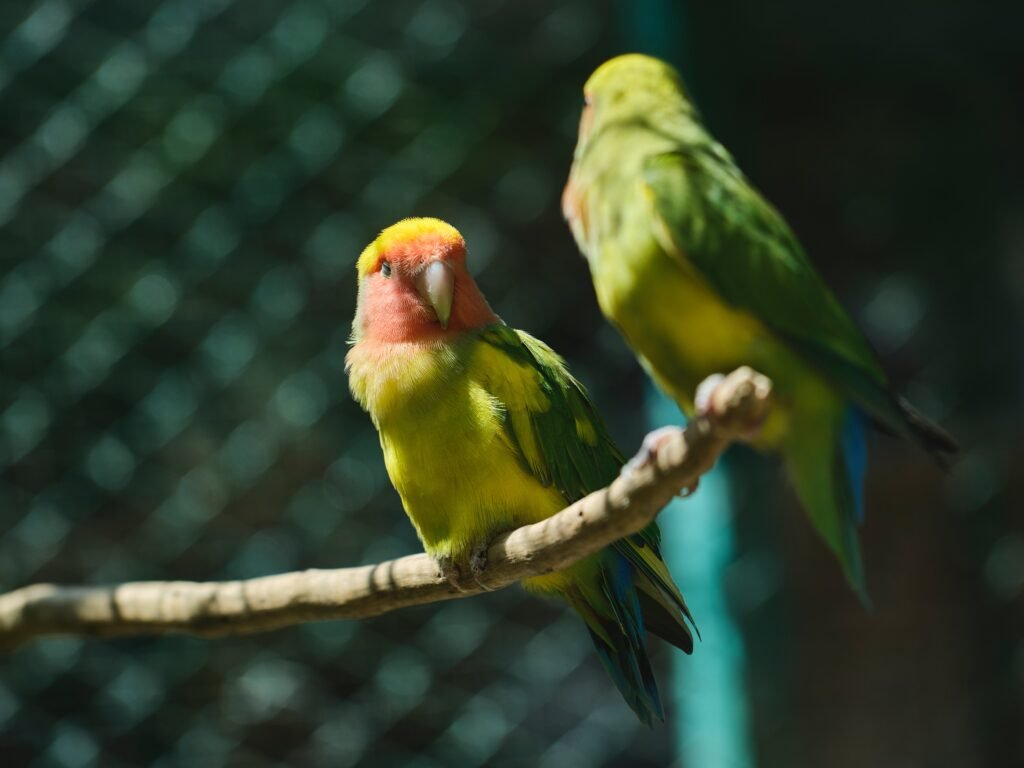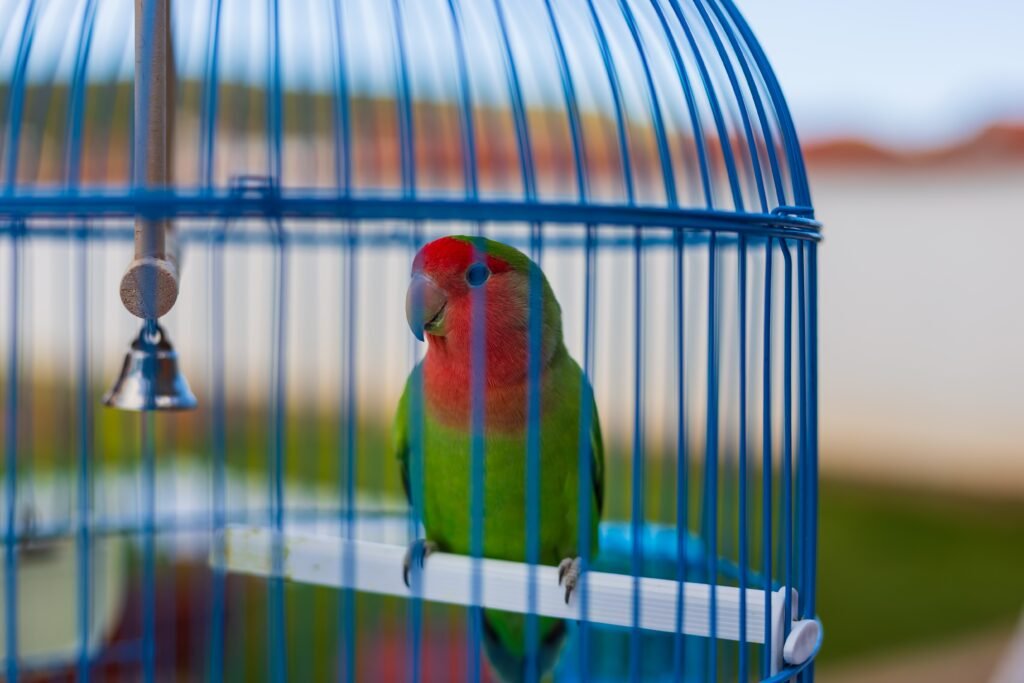Lovebirds are delightful and beautiful birds that make wonderful companions. To ensure their health and well-being, providing them with a nutritious and balanced diet is essential. This article will explore tips and guidelines for feeding your lovebirds, helping you provide them with the best possible nutrition.
Introduction
Lovebirds are delightful and beautiful birds that make wonderful companions. They are known for their vibrant colors and playful personalities. To keep your lovebirds healthy and happy, providing them with a nutritious and balanced diet is important. In this article, we will discuss lovebirds’ dietary needs and provide practical tips for feeding them.
Understanding Lovebirds’ Dietary Needs
Before we dive into the specifics of lovebird feeding, it is crucial to understand their dietary requirements. Lovebirds are omnivores, meaning they consume plant-based foods and small insects. Their diet primarily consists of seeds, fruits, vegetables, and occasional insects in the wild. To mimic their natural diet, offering a varied and balanced diet in captivity is important.
Lovebirds have specific nutritional needs that must be met to ensure their overall health and well-being. They require a diet of essential fats, proteins, vitamins, and minerals. A proper diet is crucial for their growth, development, and immune system function.
Seeds: The Mainstay of a Lovebird’s Diet
Seeds are an essential component of a lovebird’s diet. They provide essential fats, proteins, vitamins, and minerals for their health. However, selecting high-quality seed mixes specifically formulated for lovebirds is important. Avoid seed mixes designed for larger parrots, as they may contain ingredients unsuitable for lovebirds.
When choosing seed mixes, look for various seeds such as sunflower seeds, safflower seeds, millet, and canary grass seeds. These seeds provide the necessary nutrients and offer various textures and flavors to keep your lovebirds engaged and interested in their food.
It is important to note that while seeds are an important part of a lovebird’s diet, they should not be the sole source of nutrition. Lovebirds need a diverse range of foods to meet all their nutritional requirements.
Pellets: A Nutritious Alternative
Pelleted diets can be a valuable addition to your lovebird’s diet. These formulated pellets are nutritionally balanced and ensure your lovebirds receive all the essential nutrients they require. Pellets provide a convenient way to provide your lovebirds with a complete and balanced diet.
When choosing pellets for your lovebirds, opt for those specially formulated for small parrots or lovebirds. These pellets contain the appropriate protein, vitamins, and minerals for your lovebird’s health. Gradually introduce pellets into your lovebird’s diet while monitoring their acceptance and ensuring they consume various other foods.
It is important to note that pellets should only replace part of your lovebirds’ diet. They should be offered alongside other foods to provide variety and enrichment.
Fresh Fruits and Vegetables: A Colorful Treat
Including fresh fruits and vegetables in your lovebird’s diet is crucial for their health and well-being. They provide essential vitamins, minerals, and antioxidants that support their immune system and prevent nutritional deficiencies. Fruits and vegetables also offer a range of flavors and textures that can make mealtime more enjoyable for your lovebirds.
Some suitable fruits for lovebirds include apples, grapes, bananas, blueberries, and melons. When offering fruits, ensure they are ripe and free from pesticides. Cut them into small, bite-sized pieces to make eating easier for your lovebirds.
Carrots, broccoli, leafy greens (spinach, kale), and bell peppers are excellent lovebird choices. These vegetables are rich in vitamins and minerals and provide a satisfying crunch that can help keep your lovebirds’ beaks healthy.
Remember to thoroughly wash all fruits and vegetables before offering them to your lovebirds. Remove any seeds or pits that may be present, as they can be toxic to birds. Rotate the types of fruits and vegetables you offer to provide variety and ensure a well-rounded diet for your lovebirds.
Sprouted Seeds: A Nutritional Boost
Sprouting seeds is an excellent way to enhance their nutritional value. Sprouted seeds are rich in enzymes, amino acids, vitamins, and minerals, making them a nutritious addition to your lovebird’s diet. They are also easier to digest, making it easier for your lovebirds to absorb the nutrients.
To sprout seeds, soak them in water for a few hours and then rinse them daily until sprouts appear. Offer the sprouted seeds to your lovebirds as a healthy and tasty treat. You can mix them with other foods or offer them separately.
Sprouted seeds can also be a great source of enrichment for your lovebirds. They provide a different texture and taste, keeping your lovebirds engaged during mealtime.
Insects and Proteins: A Natural Source of Nutrition
In the wild, lovebirds consume small insects as a significant part of their diet. While offering live insects may not be feasible, you can provide alternative protein sources such as mealworms and boiled eggs. These protein-rich foods should be in moderation, and any eggs should be thoroughly cooked to eliminate the risk of bacterial contamination.
Mealworms are readily available at pet stores and can be offered as a treat to your lovebirds. They are a great source of protein and can add variety to your lovebird’s diet. Boiled eggs can also be given occasionally, but make sure they are completely cooked and cooled before offering them to your lovebirds.
Protein is essential for your lovebird’s growth, feather health, and overall well-being. However, it is important to remember that protein should not make up a large portion of their diet. It should be offered as a supplement to their regular diet.
Water: The Essential Nutrient
Clean and fresh water is vital for your lovebird’s health and hydration. Ensure that your lovebirds have access to clean water at all times. Change the water daily and clean the water dish thoroughly to prevent bacteria and algae growth.
Consider using a water dispenser designed specifically for birds to prevent contamination and spills. These dispensers provide a constant supply of fresh water and reduce the risk of contamination.
Feeding Schedule and Portion Sizes
Establishing a regular feeding schedule is essential for your lovebird’s well-being. Offer fresh food in the morning and remove any uneaten portions in the evening. This helps maintain hygiene and prevents spoilage. Monitor your lovebird’s eating habits and adjust portion sizes accordingly. It is important to strike a balance between providing enough food and preventing overfeeding, which can lead to obesity and other health issues.
Lovebirds have small stomachs and high metabolisms, so offering small and frequent meals throughout the day is important. This mimics their natural feeding behavior and ensures they receive a steady supply of nutrients.
Remember that lovebirds are individuals, and their food preferences may vary. Observing your lovebirds’ eating habits and adjusting their diet is important. Offer a variety of foods to provide them with a diverse and well-rounded diet.
Conclusion
Feeding your lovebirds a nutritious and balanced diet is vital for their health and happiness. You can ensure your lovebirds receive the essential nutrients they need by incorporating high-quality seeds, pellets, fresh fruits, vegetables, sprouted seeds, and occasional protein sources. Remember to always provide clean and fresh water, establish a feeding schedule, and monitor portion sizes to maintain their well-being. By following these tips, you can contribute to the longevity and vibrancy of your lovebirds.
Lovebirds Feeding: Tips for Providing Nutritious Meals to Your Lovebirds – FAQ
1. What are the dietary needs of lovebirds? Lovebirds are omnivores and require a diet rich in essential fats, proteins, vitamins, and minerals for their growth, development, and immune system function.
2. Can seeds be the sole source of nutrition for lovebirds? No, while seeds are an important part of a lovebird’s diet, they should not be the sole source of nutrition. Lovebirds need a diverse range of foods to meet all their nutritional requirements.
3. Are pellets a suitable addition to a lovebird’s diet? Yes, pelleted diets can be a valuable addition to a lovebird’s diet as they are nutritionally balanced and ensure that lovebirds receive all the essential nutrients they require. However, pellets should not replace the entire diet and should be offered alongside other foods to provide variety and enrichment.
4. What fruits and vegetables are suitable for lovebirds? Suitable fruits for lovebirds include apples, grapes, bananas, blueberries, and melons. Suitable vegetables include carrots, broccoli, leafy greens (spinach, kale), and bell peppers. Wash all fruits and vegetables thoroughly before offering them to lovebirds, and remove any seeds or pits that may be toxic to birds.
.


